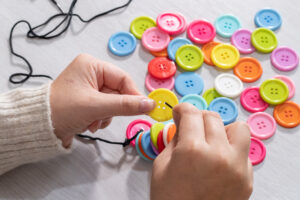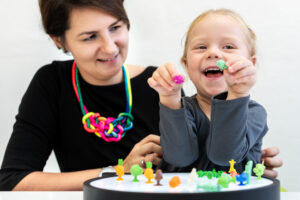The Importance of Developing a Pincer Grasp in Children
What is a pincer grasp?
A pincer grasp is when you are able to isolate your pointer finger and thumb to hold an item, rather than using your whole hand. This looks like you are forming an “o” with your thumb and pointer finger. This grasp supports independent manipulation of items with both precision and dexterity.

When does a pincer grasp develop?
The grasp pattern emerges when a baby is between 6-12 months old and is one of the first dexterity skills to develop. This grasp enables babies to pick up small objects, allowing them to explore self-feeding, and their surroundings in new and exciting ways. The development of hand-eye coordination also begins here. As children grow, they move from using their whole hand, to using their fingers to manipulate small objects.
Why is it so important?
When children have an immature grasp, they will find it difficult to manipulate and play with smaller items, such as blocks and beads. Children also may struggle with independence in completing self-care tasks such as dressing (manipulating buttons, zips, and tying laces) and eating with cutlery. As they enter school, children with a weaker pincer grasp may find it difficult to cut out shapes with scissors or control a pencil for drawing and writing.

How can I help my child develop their pincer grasp?
There are lots of fun activities and games that you can play at home to help encourage your child to develop their pincer grasp. When children are playing with toys that need to be squeezed, pushed together, or pulled apart, they are strengthening the small muscles in their hands and in turn their pincer grasp.
Some fun things to do at home include:
- Using tongs or tweezers to pick up objects such as pom poms or cotton balls helps to strengthen their muscles needed to hold their pencil.
- Play or racing with wind-up toys
- Water play with an eye dropper and coloured water
- Hiding small objects such as beads in slime, putty or play doh
- Peeling and then placing stickers
- Many board games are great for encouraging pincer grasp, such as Jenga, and Operation

If you have any questions or are concerned for your fine motor development and would like further information regarding therapy or the intervention process, please don’t hesitate to get in touch with our Occupational Therapists via [email protected] or call us at the clinic on (07) 3265 4495.

Helena Manicaros
Registered Occupational Therapist
